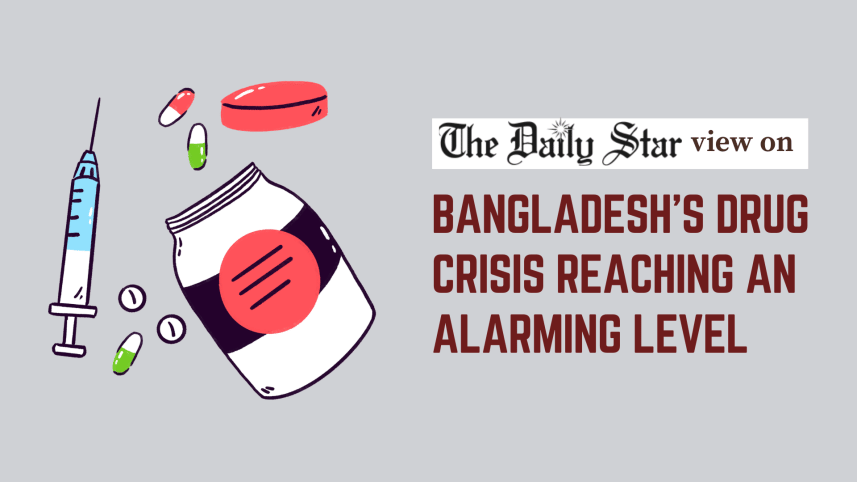We cannot lose the battle against drugs

Given the alarming levels Bangladesh's drug crisis has reached of late, it is high time the authorities and society at large treated it with the urgency it deserves. According to an estimate by the Department of Narcotics Control (DNC), there are now around 8.3 million individuals addicted to drugs, constituting 4.89 percent of the total population. This highlights the ineffectiveness of existing drug control measures that should have done better.
There are some clear patterns that can be observed among drug users in the country. For instance, the survey estimates that 7.76 million of those addicted are men, mostly young, while the most commonly used substances include cannabis (approximately 52 percent), yaba (20 percent), and alcohol (17 percent). By thoroughly analysing these demand-side factors, the authorities should be able to identify and address the social, political, and economic drivers of drug abuse. Unfortunately, the absence of large-scale initiatives in this regard shows how indifferent we have remained despite the risks of a growing drug crisis.
The country is being flooded with drugs both for domestic consumption and transit to third countries. Both trends are deeply damaging for us. A major obstacle to curbing drug supply is the lack of resources available to our security forces, compounded by legal complexities and our geographical location—at the intersection of the Golden Triangle, the Golden Crescent, and the Golden Wedge. That we are losing the battle against drug trafficking is evident from the fact that rarely have any major drug kingpins been identified or arrested over the years.
The lack of specialised treatment centres for drug addiction has been another pressing concern. For example, the four government-run facilities in the country can accommodate only 199 patients. Although more than 300 private rehabilitation centres are in operation, there is minimal oversight of their activities—and many simply cannot afford private treatment.
On the supply side, reports indicate that the country is being flooded with drugs, both for domestic consumption and transit to third countries. Both trends are deeply damaging for us. A major obstacle to curbing drug supply is the lack of resources available to our security forces, compounded by legal complexities and our geographical location—at the intersection of the Golden Triangle, the Golden Crescent, and the Golden Wedge. That we are losing the battle against drug trafficking is evident from the fact that rarely have any major drug kingpins been identified or arrested over the years, although couriers and low-level carriers, often driven by poverty and desperation, continue to be arrested in their hundreds.
The failure to apprehend domestic masterminds behind the drug trade is not only disheartening, it also suggests the deep-rooted connections they enjoy within security agencies, political circles, and other influential sectors—connections that have rendered them virtually untouchable. At the same time, given that the drug trafficking problem in Bangladesh is inextricably linked with transnational crime and criminal syndicates, it cannot be properly addressed without effective collaboration with other countries.
But first, we as a nation must realise that drug addiction is not only destroying lives but also having extremely negative effects—including increased crime, corruption, and health issues—on our society as a whole. Unless we fully recognise the danger and are sincere about preventing it, it will be impossible to address the root causes of this issue and ensure a drug-free, healthy, and happy society. We urge the authorities to take holistic measures to stop drug supply and address the underlying issues propelling its demand.



 For all latest news, follow The Daily Star's Google News channel.
For all latest news, follow The Daily Star's Google News channel. 
Comments